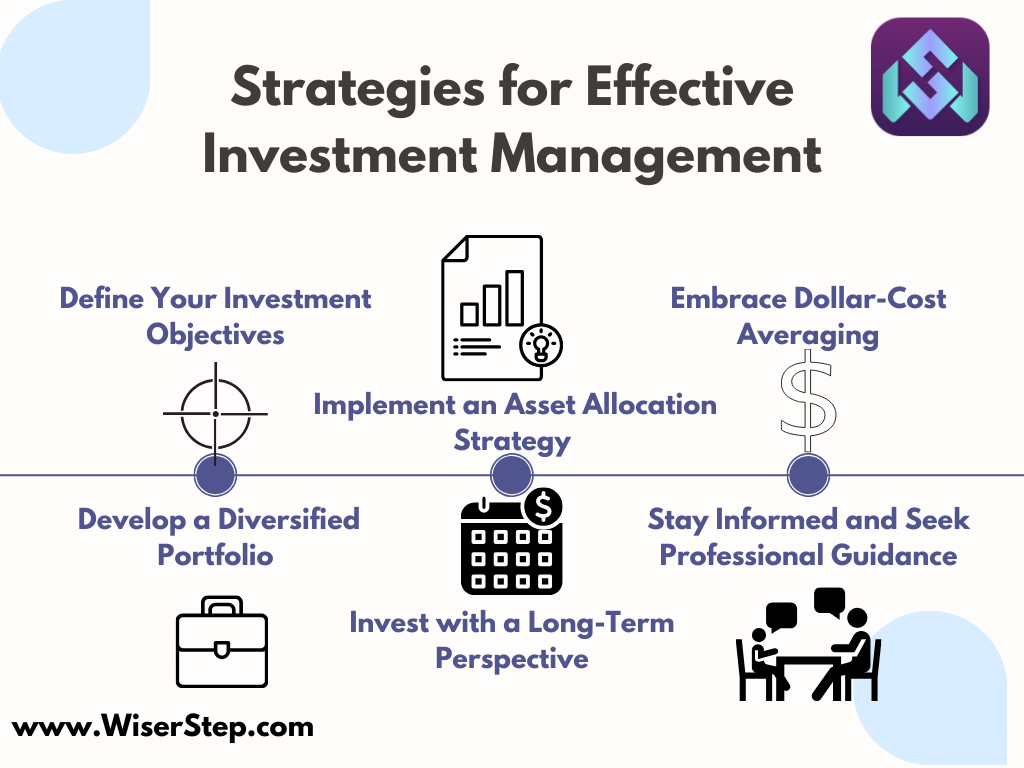Investing wisely is the cornerstone of financial success and security. Whether you’re a novice or experienced investor, effective investment management is crucial to achieving your financial goals. In this blog, we will explore seven essential strategies to help you make informed decisions and optimise your investment portfolio.
1. Define Your Investment Objectives
Before embarking on your investment journey, it’s imperative to define your investment objectives. What are you investing for? Is it a comfortable retirement, a down payment on a house, or your child’s education? Understanding your goals will guide your investment decisions and risk tolerance.
2. Develop a Diversified Portfolio
Diversification is a fundamental principle of investment management. Instead of putting all your eggs in one basket, diversify your investments across various asset classes, such as stocks, bonds, real estate, and commodities. This strategy helps spread risk and reduces the impact of poor-performing assets on your overall portfolio.
3. Implement an Asset Allocation Strategy
Asset allocation involves deciding how much of your portfolio should be invested in different asset classes based on your financial goals and risk tolerance. For instance, if you have a longer investment horizon and can tolerate higher volatility, you might allocate a higher percentage of your portfolio to stocks for potential growth.
4. Regularly Rebalance Your Portfolio
Market fluctuations can cause your portfolio’s asset allocation to drift from your original strategy. To maintain your desired risk profile, regularly review and rebalance your portfolio. This means selling overperforming assets and buying underperforming ones to bring your allocation back in line with your plan.
5. Invest with a Long-Term Perspective
Successful investment management requires patience and a long-term perspective. Avoid reacting impulsively to short-term market volatility. Keep your focus on your long-term goals and stay committed to your investment strategy.
6. Embrace Dollar-Cost Averaging
Dollar-cost averaging is a systematic approach to investing. It involves investing a fixed amount of money at regular intervals, regardless of market conditions. This strategy helps mitigate the impact of market fluctuations. When prices are low, you buy more shares, and when prices are high, you buy fewer shares. Over time, this approach can help lower your average cost per share.
7. Stay Informed and Seek Professional Guidance
Stay informed about your investments and the financial markets. Monitor the performance of your portfolio and make adjustments as needed. Additionally, consider seeking advice from financial professionals or advisors who can provide personalised guidance tailored to your specific financial situation.
In conclusion, effective investment management is key to achieving your financial objectives and securing your financial future. By defining your investment goals, diversifying your portfolio, implementing a well-thought-out asset allocation strategy, and regularly rebalancing your investments, you can navigate the complexities of the financial markets with confidence. Remember that successful investing requires a long-term perspective and patience, and it’s often helpful to seek professional guidance to make the most of your investments.

